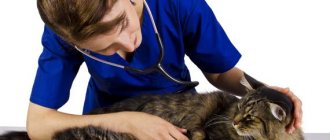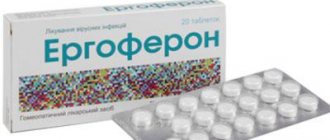Rotavirus is a common disease that affects the gastrointestinal tract; the disease is especially severe in young children under 3 years of age. An unpleasant side effect of rotavirus infection is stomach pain. The danger comes from the consequences after an illness.
With effective and correct treatment, after 10-15 days the functioning of the intestines and stomach is normalized, and the child begins to eat normally. Before this, you should follow a strict diet.
Causes of intestinal infections in children and adults
Sudden vomiting, diarrhea, abdominal pain, intoxication and dehydration - acute intestinal infection (AI) comes unnoticed and manifests itself unexpectedly. Both adults and children suffer from acute intestinal infections all year round, but the peak incidence usually occurs in summer and autumn.
The causes of acute intestinal infections can be viruses (enterovirus and rotavirus infections), toxins (toxicoinfections), bacteria (cholera, dysentery, salmonellosis), fungi, and protozoan microorganisms. Infection itself occurs through the fecal-oral route. In other words, you can become infected with OKI through untreated water, unwashed hands, dirty food or food that has become unusable, and household items. Insects, such as flies, also become carriers of pathogens of intestinal infections.
Naturally, small children from one to seven years of age suffer most often from OCI - it is for them, due to their age, that it can be difficult for them to follow precautionary measures and hygiene rules.
What is the most dangerous thing about acute intestinal infection? Firstly, the person who has had it does not acquire stable immunity to it and may well get sick more than once. And secondly, if measures are not taken, OCI can cause severe dehydration and lead to death.
What causes body poisoning
Almost all organs and systems are susceptible to toxic infectious damage, but the central nervous system suffers the most. Intoxication is especially difficult for children, especially young ones. They have not yet developed enough mechanisms to resist infection. Intoxication is caused by the viral particles themselves, the decay products of diseased cells of the human body and immune defense cells - macrophages. The consequence of the toxic effects of this is the impact of pathological biologically active substances on the vascular wall, which leads to increased permeability and swelling.
Prolonged fever, lack of effect from treatment, or deterioration of condition after short-term stabilization are alarming signals of the development of complications, especially with influenza. There is a high probability of developing infectious-toxic shock, accompanied by cardiovascular, respiratory failure, bleeding disorders and acute damage to the central nervous system in the form of seizures and cerebral edema.
Main symptoms of intestinal infection
Intestinal infection has a fairly short incubation period. Usually it does not exceed a day. In some cases, only a few hours pass from infection to the appearance of symptoms, and with toxic infections the incubation period can be up to seven days.
Depending on the type of acute intestinal infection, the patient may experience one or several of the listed symptoms.
Complications
Severe poisoning adds complications to the child. They can be expressed as:
- neurotoxicosis;
- insufficient blood circulation;
- pulmonary failure;
- renal failure;
- stomach bleeding;
- hypovolemic shock.
With neurotoxicosis, convulsions occur, the child does not understand where he is, becomes delusional, and hallucinations appear. Circulatory failure occurs when dehydration occurs. The pressure drops, the skin turns pale, and the heart sounds are muffled.
Pulmonary insufficiency is expressed by shortness of breath and shallow breathing. Kidney problems lead to lower back pain and decreased daily urine output. Hypovolemic shock occurs when fluid is lost, reducing body temperature and weight.
Start the fight yourself!
As already mentioned, the main danger posed by an acute intestinal infection is dehydration. This leads to the main task – to prevent this from happening. The solution is simple - drink as much as possible. If OKI occurs in a mild form, ordinary water or weak tea is suitable as a drink. If the patient suffers from vomiting, then you can add a little lemon juice to the drink.
When OCI is expressed in frequent vomiting, copious and frequent loose stools, and increased body temperature - and this is how it usually goes, for example, in young children - it is better to use special solutions for dehydration, as well as sorbent preparations, for example, Enterodes. The solutions will cope with dehydration, and the sorbent will effectively and quickly help not only relieve the symptoms of acute intestinal infections, but also help remove the cause of the infection from the body.
It is very important to constantly monitor the patient’s condition, especially when it comes to a child! Remember, young children lose fluid much faster than adults, which means the risk is much higher!
Necessary actions
If rotavirus manifests itself in a child, the following measures must be taken urgently:
- Replenish the water-salt balance with special preparations, such as Regidron.
- Monitor your child's body temperature regularly.
- Try to stop vomiting.
- Follow a strict diet.
If you don’t have Regidron at hand, you can make your own saline solution at home. To do this, you will need to mix 1 liter of water with 3 g of kitchen salt, 2 g of baking soda, 30 g of sugar.
When should you see a doctor?
It turns out that when treating OCI you can do without a doctor? This is not entirely true. If the symptoms do not disappear, the patient’s well-being does not improve, and even more so, if the situation worsens - for example, vomiting has become more frequent or the temperature has increased - then, of course, it is necessary to consult a specialist. Well, if a small child gets sick, you need to call a doctor in any case.
Is it worth calling an ambulance if you have OCI? It depends on the patient's condition. If he becomes pale, the mucous membranes begin to dry out, the skin becomes flabby, while the patient refuses to drink, and urination begins to occur less frequently - all these are clear signs of serious dehydration, for which emergency assistance is necessary. It is necessary to dial 03 even if there is blood in the patient’s stool and vomiting becomes uncontrollable.
Causes of viral intoxication
It is very difficult for the human body to fight any viral infection. Viruses damage the epithelium of the respiratory tract. A self-harm mechanism begins to operate, in which mucosal cells begin to produce damaging elements that cause inflammation. As a result, the vessels become more vulnerable and the body's defenses decrease. During this period, viruses have a poisonous effect on the body. In areas where the vessels have weakened protection, they easily allow foreign substances to pass through. This contributes to the occurrence of poisoning, as a result of which the person begins to feel weak.
Normally, in any body, protective forces should be activated to neutralize the infection.
But if the infection is bacterial, or the disease is very severe, these mechanisms are not able to work. Intoxication appears.
The best treatment is prevention: how to protect yourself from OCI
It is impossible to guarantee that you and your loved ones will never encounter an intestinal infection. But everyone can reduce the risk of developing OCI. At the beginning of the article, we described exactly how infection occurs. Preventive measures suggest themselves: wash your hands regularly, practice good hygiene, especially on the road, and do not drink unboiled water if you are not sure of its safety. As for food, foods eaten raw must be washed; prepared foods, even in cool weather, must be stored in the refrigerator or heated to 60 degrees Celsius.
Separately, it is worth mentioning the prevention of salmonellosis. You can get salmonellosis by eating raw eggs. In addition, Salmonella is often found in traces of chicken feces on the shell. Make it a rule to thoroughly wash your eggs with soap and water before cooking, and be sure to thoroughly boil and fry them.
And besides, be sure to keep a few sachets of an effective sorbent on hand, for example, Enterodeza. This drug can be used not only after unpleasant symptoms have already appeared, but also before, for the purpose of prevention. If you are not sure about the quality of what you just ate, take Enterodes preventively or at the first symptoms of illness, and then OCI will bypass you!
Why does my stomach hurt after rotavirus?
After an illness, an unpleasant symptom can be caused by flatulence in the intestines.
Since after an illness the intestinal microflora is in a deplorable state, frequent stomach cramps and manifestations of flatulence are observed. These factors can cause severe pain in the abdominal area, namely in the stomach and intestines. To reduce spasms and eliminate pain, you should take antispasmodics. To prevent stomach pain after an infection, it is necessary to restore the intestinal microflora.
How to relieve pain?
- Dill water, mineral water without gas - relieve nausea, remove gases.
- A decoction of mint, lemon balm, chamomile and simple tea without sugar - soothe the muscles of the affected organ and relieve inflammation.
- Rice water - helps with diarrhea.
Are antibiotics needed?
The issue of using antibiotics for intestinal infections is complex. Often in hospitals they are used by everyone, regardless of stool cultures and clinical findings, resulting in more harm than good. These drugs usually have a wide spectrum of action and kill not only pathogenic microbes in the intestine, but also some beneficial microbes that actively fight the manifestations of intestinal infection. It is important to remember that during intestinal infections, it is the beneficial microflora that becomes a barrier to the spread of infection to the intestinal wall and the penetration of microbes and viruses deeper. Our beneficial microbes displace the enemy and gradually eliminate diarrhea. The use of chloramphenicol or tetracycline on the advice of grandmothers becomes especially dangerous. They not only kill the entire intestinal flora, but also affect the teeth, ears and many internal organs. For watery diarrhea (except cholera), antibiotics are not used. The indication for the use of antibiotics is microbial diarrhea - when there is blood, mucus, and greens in the stool. Antibiotics are always prescribed when inoculating dysentery pathogens, salmonella, cholera, typhoid fever and other dangerous infections. Most intestinal infections do not require such aggressive treatment. Photo - Lori's photo bank
Recommendations for treatment of children
The fever in children will last as long as the body needs to fight the pathogenic pest that caused the infection. Antipyretics are mainly used to treat the disease. But before you bring down your temperature with medicine, it’s worth trying physical options:
- wipe the child;
- give water to drink;
- cool with heating pads filled with cool water.
When using a fever reducer, you should strictly adhere to the dosage regimen indicated in the instructions according to the person’s age and weight. For an intestinal infection, you need to choose a remedy in a suitable form, taking into account the symptoms. When a child has stomach flu and is tormented by vomiting, taking the medicine orally is ineffective; it is preferable to use suppositories or reduce the temperature by injection. If you have diarrhea, there is no point in using suppositories, since most likely they will not have time to dissolve, and repeated administration can lead to an overdose.
How can you get the stomach flu?
The virus enters the human body through the mucous membrane of the gastrointestinal tract. The incubation period of this disease is from 16 hours to five days. The rate of development and severity of stomach flu depends on the concentration of the pathogen that has entered the body and the state of the person’s immune system.
- One type of transmission of infection is foodborne. That is, the infection enters the body through unwashed fruits, vegetables, and low-quality dairy products. Gastrointestinal flu can rightfully be called the “disease of dirty hands.” It is also possible to become infected through unboiled tap water, even during simple bathing.
- The second route of infection is airborne. When speaking loudly, sneezing, or coughing, germs from a sick person spread into the air.
- Contact and household transmission of the pathogen cannot be ruled out, especially in crowded places: in offices, kindergartens, schools, shops.
The causative agent of stomach flu is very viable; ordinary detergents are not able to destroy it. It is quite resistant to freezing and high temperatures, and can withstand heating up to 60 C. The intestinal virus is destroyed only by concentrated chlorine-containing disinfectants.
What happens in the body during infection?
When rotavirus penetrates the body, within half an hour the pathogen can be detected in the cells of the small intestine. Due to the attack of the virus, the structure of the intestinal mucosa is disrupted. This in turn leads to disruption of the production of digestive enzymes responsible for the breakdown of complex sugars. Thus, unbroken carbohydrates accumulate in the small intestine, which attracts excess fluid, causing diarrhea or watery diarrhea.
Symptoms of the disease
The disease has three stages: • Incubation period (1-5 days), • Acute period (3-8 days), • Recovery period (3-5 days).
During the incubation period, the infection does not manifest itself in any way. The baby is cheerful and active, but the virus is already spreading in the intestines.
The acute period begins with a sharp disorder of stool and vomiting.
A high temperature rises and lasts up to 5 days. The clinical picture of rotavirus infection in children is almost always the same. In the morning, the child becomes ill, has sharp abdominal pain, and refuses to eat. Vomiting may occur even with an empty stomach. The baby becomes irritable, whiny, pale and thin. Infants have a clearly audible gurgling sensation in the abdomen. Then diarrhea of a characteristic yellowish color occurs. Vomiting becomes frequent, the body reacts to the water drunk. The temperature in the evening reaches 38 degrees and above. Hyperthermia due to rotavirus infection in a child is persistent. It's hard to reduce it. With its help, the body tries to cope with the disease on its own. The virus that causes intestinal infection dies when the temperature reaches 38 degrees.
There is no exact answer as to how long the disease will last. Each person experiences it individually. In most cases, with timely, competent treatment, symptoms disappear after 5-7 days and recovery occurs. After a rotavirus infection, the child develops immunity, so re-infection does not occur.
Self-medication or professional experience?
But parents should not be scared and despair. This rotavirus intestinal infection is not the worst thing that can happen to their baby. Komarovsky claims that over 90 percent of all cases of intestinal infections can be overcome without the use of special medications. But the remaining 10% are the most insidious and terrible. This is exactly the case when self-medication should under no circumstances be used! The most important thing in this situation is to bring the baby to infectious disease specialists as soon as possible.










